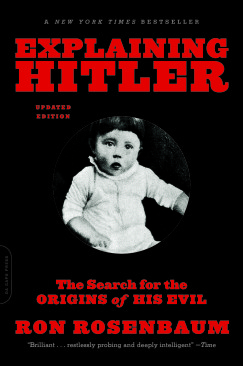Laurie Winer, Senior Fiction editor, blogs about a LARB exclusive online today: Ron Rosenbaum’s new Afterword to an updated edition of his brilliant 1998 opus, Explaining Hitler.
By Laurie Winer
Of the billions of words written about the Holocaust, some of them brilliant and harrowing, others of them idiotic and harrowing, nothing reaches (or indeed tries to reach) the exuberance of Mel Brooks’s 1968 film The Producers, a comedy cri de coeur that says, essentially, this: We’re alive and you’re dead, and we’re laughing at you.
This is also, I believe, the reason for the popularity of the YouTube Downfall parodies — in which amateur comedians all over the world add their own subtitles to one of the film’s final scenes, showing Hitler in his last days in the bunker. In the scene that became a meme, Hitler, played by Bruno Ganz, is freaking out because he knows the war is lost; he’s screaming at his generals and squirming in anguish while subordinates throw anxious glances. The parodists have him freaking out about other things, such as Liza Minnelli not winning a Tony (I may have made that one up) or having to go see the movie You Don’t Mess with the Zohan because all the other movies are sold out. Again, there is something oddly appropriate, as well as euphoric, in laughing at the entity known as Adolph Hitler in what is supposedly his most desperate moment, and piling on any humiliation we can imagine.
Interestingly, there is evidence that when Hitler imagined himself being mocked, he could hear the laughter of the Jews in his inner ear. As Lucy Davidowicz wrote in her 1975 book The War Against the Jews, Hitler repeatedly referred to the laughter of the Jews in various speeches in the late 1930s and early ‘40s. What he said was always along the lines of this chilling passage, delivered at the Reichstag on September 1, 1939:
The Jews laughed once also in Germany at my prophesies. I do not know if they are still laughing also today, or if their laughter has not already subsided. But I can also now only assert: Their laughter everywhere will subside.
And so we prove him wrong.
I learned about Davidowicz’s book, as I learned so many things, from Ron Rosenbaum’s 1998 Explaining Hitler, which Da Capo Press is bringing out in a new and updated edition this summer. Rosenbaum examines how our search for some kind of meaning, when we read about the Holocaust or about Hitler, can be a treacherous endeavor, and he guides us through the many attempts at explanation from historians and filmmakers, pointing out the logical and moral failings in so many of these attempts. In a way, Explaining Hitler is about the search for meaning itself, especially in the face of such dire news about the capabilities of man. Explaining Hitler is one of my favorite books, so I was delighted beyond reason when Rosenbaum decided to publish his new Afterword to the book with us at the LA Review of Books. You can check it out here.


